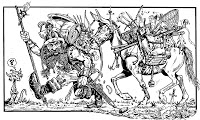 Over at Grognardia, James M. posted a list of elements that could be said to go into making an old-school-type dungeon. That got me thinking to an element of the megadungeon-style campaign (not the only thing that’s needed to create such campaign, but I would argue it’s one of the tentpoles of such a campaign) that is particularly lacking in modern, 4th-edition-style gaming. That is, the dungeon (or wilderness, etc.) as logistical challenge.
Over at Grognardia, James M. posted a list of elements that could be said to go into making an old-school-type dungeon. That got me thinking to an element of the megadungeon-style campaign (not the only thing that’s needed to create such campaign, but I would argue it’s one of the tentpoles of such a campaign) that is particularly lacking in modern, 4th-edition-style gaming. That is, the dungeon (or wilderness, etc.) as logistical challenge.
Many of the things that really irk modern players about 0E and 1E are actually part and parcel of this idea in action. Cursed items. Unidentifiable teleporters. Level-draining undead. Instant-death poisons and monsters. These aren’t the DM trying to “stick it” to the players. They are just another oblique means of challenging the players, rewarding forethought and caution, and offering choices of whether to press on or retreat in the face of adversity.
Take curses, for example. Clerics are, by the very fact that cursed items exist and other curse-type effects can befall adventurers, forced to decide whether they want to spend a spell-slot on the spell remove curse. The fact that they are forced to choose blindly (i.e., not knowing whether or not they’ll need that particular spell on the foray for that particular day) is part of the challenge. They must play the odds, and if they choose to gamble that a remove curse isn’t worth taking, the PCs will pay the price if they are either reckless or unlucky.
Teleporters. I am told that a certain publisher of old-school modules actually received complaints that there were teleporters therein which were not known to the PCs when they activated. But one of the biggest logistical challenges of an old-school game is to actually be able to get out the way you came! No one is guaranteed an accurate map; unless the PCs are going at 1/10th speed (and therefore getting ten times the wandering monster checks), they don’t know whether a corridor is 60′ or 80′ long. The presence of subtle teleporters (or sloping passages, etc.) is just another way of making an accurate map a harder thing to achieve. And challenge is part and parcel of the game. And at their most challenging, they can even tax the food and drink of the PCs, if they manage to get themselves hopelessly lost.
Level-draining undead are no more, so I’m told, in 4E. More’s the pity. Contrary to popular opinion, they’re not just a way to punish an uppity player; they’re a way of forcing hard decisions and draining precious resources. At their easiest, they take away 10,000+ g.p. from the victim. At their worst, they force the newly-reduced player to decide whether they want to continue on their current level of the dungeon, or retreat to a higher level where the challenges are slightly easier. The same holds true for the venerable rust monster. If a fighter has just gone from AC 2 to AC 9 because his plate mail just became brunch for a propeller-tailed beastie, the party could well have some tough decisions to make. Do we go on, or do we retreat back to the town to re-armor the meat-shields? It’s not an obvious choice, and the temptation to explore “just one more room” is a strong one.
This sort of attitude towards the dungeon brings an old, but often overlooked, dimension to the career of dungeon-explorer. It should go without saying that actively rolling for wandering monsters and keeping track of encumberance (and food) are vital to this sort of play. The use or retention of resources, be they magical or mundane, and the need to balance the benefits of further exploration in the face of losses (whether they be of h.p., levels, armor, weapons, etc.) is a vital decision that adds immeasurably to the game.









Level draining undead is a great way to separate the serious delvers from the weekend hackmonkeys. In my experience the smart players run like hell at the sight of level drainers, only returning (if they choose to come back!) with extra holy symbols, holy water, garlic, restoration scrolls, stakes, and most importantly of all, A PLAN.
Absolutely, Jeff. And I ran across a vital quote in the AD&D PH, waaaaay back in the section after the spell descriptions (which most players don't even realize is there, but I digress)…
…at least talk to the better players so that you will be able to set an objective for the adventure. Whether the purpose is so simple as to discover a flight of stairs to the next lowest unexplored level or so difficult as to find and destroy an altar to an alien god, some firm objective should be established and then adhered to as strongly as possible. Note, however, that inflexibility or foolish stubbornness is often fatal.
Wise words.
The logistics management is a major part of what makes these things feel, “real”, to me. The same as in books and movies, the suspension of disbelief is something I require. I can buy into the fantastic more easily if the mundane is still considered along side of it.
‘Way way back, undead weren’t the only thing draining levels.
The Giant Leeches in Blackmoor drain a level for every round they’re attached… AND you need to get a Cure Disease within a month or die.
The wilderness could be less safe than the dungeon back in the day…